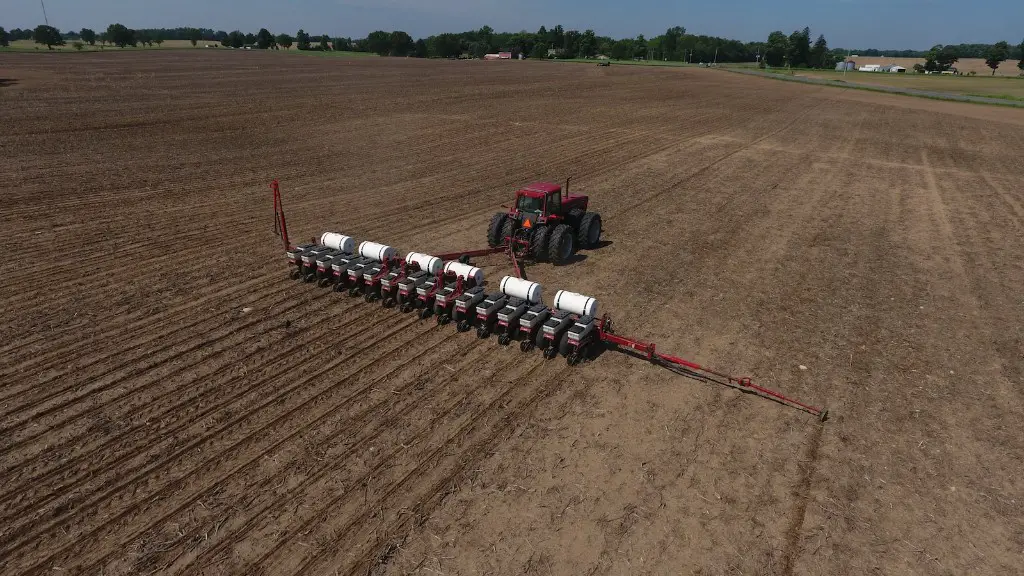The invention agriculture was important because it allowed for the domestication of plants and animals, which led to the development of civilizations. Agriculture allowed for the growth of cities and the rise of civilizations. It also allowed for the growth of food surpluses, which allowed for the development of trade and commerce.
The invention of agriculture allowed humans to domesticated plants and animals, which lead to the development of civilizations. Agriculture allowed for the growth of cities and the rise of civilizations. Agriculture allowed for the growth of food surpluses, which allowed for the development of trade and commerce. Agriculture allowed for the growth of cities and the rise of civilizations.
What is the most important agriculture invention?
A tractor is an essential piece of equipment on any farm. These machines help farmers increase productivity, which leads to larger farms. In the early 1900s, tractors were powered by steam engines. Today, they are powered by gasoline or diesel engines.
Agriculture is important because it helps sustain life. Agriculture provides the food we need to survive. Agriculture also contributes $7 trillion to the US economy. Despite agriculture’s importance, the Economic Policy Institute reports that farmworkers are among the lowest-paid workers in the US.
What’s the importance of agriculture
Agriculture is an integral part of any community, large or small. It provides us with the food we eat and the products we use every day. It also supports the local economy by providing jobs and revenue.
In order for agriculture to continue to thrive, it requires a strong infrastructure. This includes things like roads, bridges, and storage facilities. Without these support systems, agricultural operations would not be able to function properly.
Investing in agricultural infrastructure is essential to ensuring that our food supply is secure and that our economy remains strong.
The agricultural revolution had a variety of consequences for humans. It has been linked to everything from societal inequality—a result of humans’ increased dependence on the land and fears of scarcity—to a decline in nutrition and a rise in infectious diseases contracted from domesticated animals.
How did inventions in agriculture improve farming?
The advances in machinery have helped the farmers to cultivate more land and also increase their yields. The seed, irrigation and fertilizers have also helped in this regard.
The Agricultural Revolution was a time of great change for farmers. The reaper and thresher were two key inventions that made farming more efficient and less wasteful. The spread of railroads and trains also made it easier for farmers to transport their goods to market.
How did agriculture benefit us?
Agriculture’s share of the overall US economy has grown in recent years, reaching a high of 1264 trillion in 2021. This sector contributes 54-percent of the nation’s gross domestic product (GDP), with the output of America’s farms accounting for 07 percent of GDP. The agriculture, food, and related industries are a vital part of the US economy and play a significant role in sustaining the country’s growth.
The agricultural revolution was a pivotal moment in human history. It marked a fundamental change in the way that people lived and interacted with their environment. Prior to the agricultural revolution, most people were hunter-gatherers. They moved around in small groups in search of food. This way of life was nomadic and often didn’t allow for much personal belongings. The agricultural revolution changed all of that.
With the development of agriculture, people were able to settle down in one place. This led to the growth of small settlements which eventually became towns and cities. Agriculture allowed for the production of surplus food, which freed up people to pursue other interests. Prior to the agricultural revolution, most people’s time was spent simply trying to find food. The agricultural revolution made it possible for people to lead more comfortable and productive lives.
Why was agriculture so important to the colonies
Agriculture was an essential part of early colonialism, as it was both a key economic driver (by increasing profits for European investors) and a way to increase local food production to sustain populations of workers in other industries (such as mining). This dual role made agriculture a key part of the colonial enterprise, and its importance has only grown in the centuries since. Today, agriculture is still a vital part of many economies around the world, and its importance to global trade and food security is undisputed. As we look to the future, it is clear that agriculture will continue to play a pivotal role in the world economy and in the lives of billions of people.
Agriculture continues to be the backbone of many industries in India, providing raw materials for a wide range of products. From staples like sugar and rice to moreluxurious items like cotton and jute fabric, tobacco and edible oils, many industries rely heavily on agricultural resources. And with a steady population growth and ever-increasing demand for processed goods, this reliance is only likely to grow in the future. farmers and agricultural workers play a vital role in sustaining many industries in India and ensuring that the country’s economy continues to thrive.
What are three Importances of agriculture?
Agriculture has always played a key role in preserving the environment. The increased biodiversity that results from good agricultural practices helps to improve soil health, prevent erosion, and improve water conservation. In addition, healthier pollinators are essential for a healthy environment. By working together, we can continue to improve the environment for future generations.
The term agriculture includes a range of activities, from subsistence farming to horticulture, but it is generally used to refer to commercial, large-scale farming. Agriculture is important because it provides food, feed, fiber, fuel, and other products that are essential to human life and economic development.
Agriculture is the mainstay of the Indian economy. It contributes around 17% to the Gross Domestic Product (GDP), employs nearly 54% of the Indian workforce and is the largest source of livelihood in rural India. The sector is also a major contributor to the country’s export earnings.
Despite its importance, the agricultural sector in India is beset with several problems such as low productivity, fragmented landholdings, underdeveloped infrastructure, and poor access to credit and technology. These problems have resulted in the stagnation of the sector in recent years.
The government has taken various initiatives to boost the agricultural sector, such as the Pradhan Mantri Fasal Bima Yojana and the Pradhan Mantri Krishi Sinchai Yojana. These schemes are aimed at improving irrigation, crop insurance, and other inputs for farmers. In addition, the government has also created a separate Ministry of Agriculture and Farmers’
What are 3 benefits of the Agricultural Revolution
The development of agriculture allowed humans to settle in one place and develop civilizations. Agriculture also allowed for the domestication of animals, which led to many advances in technology and transportation. The industrialization of agriculture led to a massive increase in the human population, as people could now live in cities and towns and didn’t have to rely on hunting and gathering for their food.
Agriculture has definitely changed the way humans live. Instead of being nomadic and constantly on the move, we have settled down in one place and can grow our own food. This has led to the development of civilizations and the advance of human knowledge. We are no longer just wanderers or gatchers, but have become settlers.
What were the 3 important inventions that were created in the Agricultural Revolution?
The development of new tools and the improvement of old ones were important factors in the Agricultural Revolution. The plough, seed drill, and threshing machine made agricultural operations more efficient, which increased production and led to the growth of the agricultural sector.
The substantial increase in total agricultural production over the past few decades can be largely attributed to the advent of new technologies, innovations, and process improvements in the farm sector. This has allowed farmers to greatly increase their productivity and output, while also reducing the amount of labor and inputs required. As a result, agricultural production has seen a steady increase, even in the face of unfavorable weather conditions or other challenges.
Warp Up
The invention of agriculture was important for a number of reasons. First, it allowed for the domestication of plants and animals, which led to the development of civilizations. Agriculture also allowed for the growth of cities and the rise of civilizations. Without agriculture, these things would not have been possible.
The invention of agriculture gave humans the ability to cultivate and grow their own food, which led to the development of civilizations and the eventual growth of cities and empires. Agriculture allowed humans to settle in one place and create stable societies, which led to the development of art, science, and culture.





